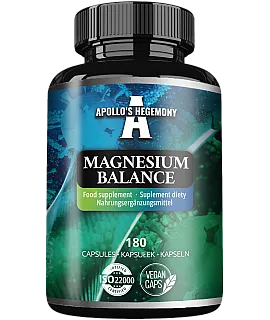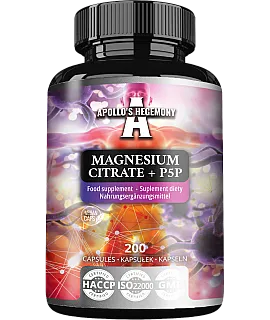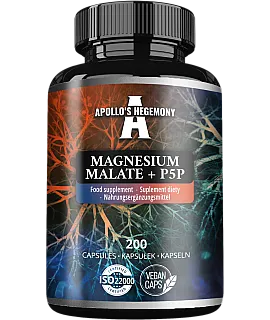Magnesium in the diet - what are the benefits?

Magnesium is the eighth most common element in the Earth's crust. In seawater, it is the third most common element. In humans, on the other hand, it ranks fourth, after calcium, sodium and potassium.
And how is it in our diet? Unfortunately, there is usually less of it than we need. Magnesium in Western-type diets is not found in optimal amounts, and statistics state that up to two-thirds of the population may not meet their magnesium needs. It is necessary to raise awareness about the momentous role of magnesium and how to configure your menus to provide enough magnesium to maintain optimal performance of all magnesium-dependent biochemical processes.
- How much magnesium do we need to consume?
- Why do we need this magnesium?
- The best dietary sources of magnesium
- What about when diet is not enough?
- Summary
How much magnesium do we need to consume?
Dietarymagnesium requirements can vary strongly depending on many parameters. Counts include age, gender, level of physical activity, medical conditions present, medications taken, level of stress experienced, and pregnancy.
There are generalized recommendations for optimal magnesium intake that can be suggested. And they look like this:
| Age | Dose [mg/day]. |
| Under 7 months | 30 |
| 7-12 months | 75 |
| 1-3 years | 80 |
| 4-8 years | 130 |
| 9-13 years | 240 |
| 14-18 years | M: 420 |
| K: 360 | |
| 19-30 years | M: 400 |
| K: 310 | |
| over 31 years old | M: 420 |
| K: 320 |
Why do we need this magnesium?
In short - so that the entire body can function properly. This element regulates the work of about 300 different enzymes. It affects the processes of energy production (ATP molecules), carbohydrate, lipid and protein metabolism, DNA and RNA synthesis, regulates nerve conduction, heart function, muscle contractions, neuronal excitability and much, much more.
Even with a slight magnesium deficiency, one can experience increased fatigue, increased blood pressure, irritability, constipation, worse stress tolerance and muscle pain. In the long term, magnesium deficiencies can increase the risk of osteoporosis, cardiovascular disease, neurodegeneration and a wide variety of diseases of civilization.
The best dietary sources of magnesium
Some of the best dietary sources of magnesium are considered to be:
- nuts (especially almonds),
- green leafy vegetables (including spinach) because of the magnesium contained in chlorophyll,
- legumes,
- whole-grain cereal products,
- cocoa,
- highly mineralized water.
Especially the last point is interesting, and often forgotten. We get about 10% of our magnesium needs from water, and it is a valuable and highly absorbable magnesium. High-mineralized water is a very efficient source of minerals for adults. Check the label for magnesium content, however, as the proportions of minerals in waters from different sources can vary.
Below is a table with a more complete list of sample foods along with the magnesium content of typical servings.
| Food | Content [mg]. |
| baked halibut, 85 g | 90 |
| roasted almonds, 28 g | 80 |
| roasted cashews, 28 g | 75 |
| cooked soybeans, 1/2 cup | 75 |
| frozen spinach, cooked, 1/2 cup | 75 |
| mixed nuts, roasted, 28 g | 65 |
| cereal, wheat, 2 rectangular cookies | 55 |
| oatmeal, 1 cup | 55 |
| uniform baked potato, medium | 50 |
| roasted peanuts, 28 g | 50 |
| peanut butter, 2 tablespoons | 50 |
| wheat bran, 2 tbsp | 45 |
| green peas, cooked, 1/2 cup | 45 |
| yogurt, 160 g | 45 |
| cornflakes, 1/2 cup | 40 |
| cooked beans, 1/2 cup | 45 |
| cooked brown rice, 1/2 cup | 40 |
| cooked lentils, 1/2 cup | 35 |
| avocado, 1/2 cup purée | 35 |
| canned beans, 1/2 cup | 35 |
| wheat germ, 2 tablespoons | 35 |
| chocolate milk, 1 cup | 33 |
| banana, medium | 30 |
| milk bar, 50 g | 28 |
| milk, 2% fat, 1 cup | 27 |
| wheat bread, 1 slice | 25 |
| raisins, 1/2 cup | 25 |
| wheat bread, 1 slice | 25 |
| whole milk, 1 cup | 24 |
| chocolate pudding, 120 g | 24 |
What about when diet is not enough?
With a perfectly balanced diet, it is possible to provide the right amount of magnesium. But do we all have a perfectly composed diet? For various reasons, but not everyone manages to maintain optimal nutrition for a long time. This is when supplementation can be considered.
Magnesiumsupplementation is a very popular treatment because magnesium is missing from the average person's diet. Fortunately, there are a number of very good dietary supplements on the market with well-absorbed, organic magnesium salts, which do not weigh heavily on the wallet, but give noticeable results.
The best results should come from choosing magnesium citrate or magnesium malate. Magnesium taurate and magnesium diglycinate also have good reputations. Complexes of several different organic magnesium compounds are also worth considering. Also of value is the addition of vitamin B6, which has the potential to promote magnesium absorption.

Summary
Statistics show that an inadequate supply of magnesium is a problem for even more than half of the population. Magnesium deficiency has many effects, both short- and long-term. Monitor your diet for magnesium content and make sure to include nuts and seeds, legumes, green leafy vegetables and whole grain products on a regular basis. Support yourself with a good-quality magnesium supplement if needed.
Sources:
 ⮜ Previous article
⮜ Previous article
Sodium butyrate in the diet - what are the sources and what dosages to use?
 Next article ⮞
Next article ⮞


